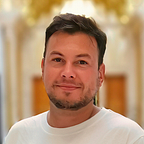On DAOs becoming self aware.
A couple days ago, a group of future DAO enthusiasts found Slack useful as as a medium for discussions but somehow lacking as a tool to achieve consensus, and decided to build a new intra-DAO forum to help drive the decision making process. Some really interesting questions were raised, including how this new tool should/would check whether its participants were DAO token holders or not (signed transactions? Something else?). A github was created.
To paraphrase /u/AurynMacmillan, it’s really exciting to see a DAO take on a life of its own, and — thanks to its future members — it’s already starting to become self aware and act autonomously.
The Slack is now one of the largest crypto chat room in the world, with 2,835 participants at the time of writing. Encouraged by how much of an impact the DAO concept is having, we’re looking forward to the exciting prospect of other Proposals.
Most of you will know that Slock.it UG will soon submit its very own Proposal to a suitable DAO for building a universal sharing application (rent/share anything, anywhere), with the Ethereum Computer as its centerpiece, the hardware reference design for a technology many see as the future of the IoT.
But what other Proposals could be out there? Last week someone on /r/ethtrader suggested building a DAO to support multiple Ethereum projects, which in itself would form a brilliant Proposal to a DAO. The code generic DAO code on github — what’s detailed in the DAO Whitepaper — would be the perfect vessel for something of that nature.
A DAO steers itself, or I should say, you steer it. The framework we put out there is the only one in world that’s 100% decentralized with no premine/pool of any kind, where DAO token holders are fully in control from day one, and for which the tokens can have actual, intrinsic value.
Now let’s figure out the synergies
Great questions I’ve seen asked on the Slack include: “Could using Digix gold-backed tokens to open locks make sense? What about storing physical gold in slockers?”.
Personally, I can think of many synergies between DAOs, for example with providers of stable coins, the key to enable mainstream payments flowing into the Slocks (as Joe Internet and his parents won’t want or be able to pay with ether).
And Oraclize would make an awful lot of sense to integrate with, as it would create an opportunity for rewards to Ethereum Computer owners by letting them earn tokens in exchange of sharing sensor data back to the blockchain.
These are just a couple ideas, feel free to join the Slack or Reddit and suggest the DAO community some more, and getting help writing your own DAOs or Proposals. Someone mentioned linking Slocks with EtherPoker so you could literarily “bet the house” on a hand of Poker. Clever or outrageous? Your call.
One thing is sure, this rapidly growing community seems about to build the Mother of all DAOs. It’s a long term project with immense traction, and it certainly won’t stop at the first Proposal.
Note this article was edited on Apr 9th, 2016 to reflect changes in the standard DAO nomenclature.
About the Author
Stephan Tual is the Founder and COO of Slock.it.
Previously CCO for the Ethereum project, Stephan has three startups under his belt and brings 20 years of enterprise IT experience to the Slock.it project. Before discovering the Blockchain, Stephan held CTO positions at leading data analytics companies in London with clients including VISA Europe and BP.
His current focus is on the intersection of blockchain technology and embedded hardware, where autonomous agents can transact as part of an optimal “Economy of Things”.
Twitter: @stephantual
Contact: stephan@slock.it
If you enjoyed reading this, please log in and click “Recommend” below.
This will help to share the story with others.
